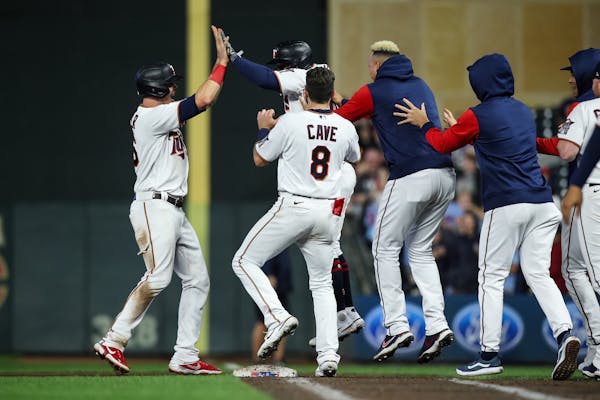After Carlos Correa invoked the revered name of French fashion house Dior, likening himself to a luxury product the Twins can easily obtain for the right — read: hefty — price, Derek Falvey went on a hunt.
"I went rummaging around in that locker in the corner, I couldn't find the price tag," the Twins' president of baseball operations joked from within the Target Field clubhouse Monday morning.
Correa's future likely will be one of the first offseason roster decisions made for the Twins, who missed the playoffs and ended below .500 for the second consecutive season. The shortstop has been clear that he wants a long-term deal, likely something in the 7-10 years, $300 million range. And while he holds the opt-out, he's swiveled the spotlight back to the Twins' front office, saying he'd be very willing to stay if the Twins can commit.
Falvey said he always knew this moment with Correa would come. The Twins signed him during spring training for $35.1 million a season for the next three years, though Correa had the option at the end of this season and next. But now is the time to start having those conversations, with Correa's choice due once the World Series ends.
"I think he really did enjoy it here. He really liked it here, for sure. He obviously has that opt-out decision to make, and we have some conversations to have internally," Falvey said. "What I would say on it is, we've already had conversations with Scott [Boras, Correa's agent] and with Carlos some. We'll continue to have those over the next few weeks. We'll never go into specifics about what that looks like. But we'll continue to try and be creative and have conversations with him and see where that takes us."
Falvey said the Twins are not quite at the stage yet of knowing just how much money and how many contract years it might take to keep Correa. The shortstop was easily the team's best defensive player and also was strong at the plate, especially in the later months of the season. He ended the year hitting .291 with 64 RBI and 22 home runs.
Without Correa, the Twins will need a shortstop at least to start next year, since Royce Lewis will still be recovering from his second ACL surgery.
Correa will likely attract suitors with deeper pockets than the Twins. Falvey said he can't be sure what other teams in bigger markets will offer but does think there is a way the Twins can compete. Albeit creatively.
"A couple of times over the last 12 months, whether it was [Byron Buxton] or Carlos, the way we kind of navigated to find mutually agreeable solutions, it takes partnership for sure. It takes an investment on both sides in maybe some of those decisions," Falvey said. "… We know Carlos is a really good player, and we know he's going to have options. Ultimately, we're going to hopefully be in the middle of that conversation."
As for the potential length of the deal, the Twins have not traditionally been keen on tying up their future in those long relationships. But Falvey said the team has made long-term offers to players in the recent past that haven't come to fruition for whatever reason, though not quite to the extent Correa is expecting.
"You can sign the single best player in the game, and if that's the only player you have, I don't think that's going to be the most successful path to being a good team," Falvey said. "So we need to balance that with, 'Where's our depth? What does it look like? Where do we invest?' I will tell you that every time I've brought a creative conversation or otherwise to ownership, we've been supported in trying to figure out how to pursue it."
Roster changes ahead
The Twins will have to make very significant decisions about their 40-man roster in the next month while protecting prospects from the Rule 5 Draft.
Free agents include Correa, catcher Gary Sanchez, reliever Michael Fulmer and starters Chris Archer and Dylan Bundy. Some top prospects are already on the roster, including pitchers Louie Varland and Simeon Woods Richardson as well as outfielder Matt Wallner.
Offseason trades are also likely looming that could involve players such as right fielder Max Kepler and third baseman Gio Urshela. Kepler's offense has lagged since a breakout season in 2019. Urshela displayed strong defense and was a solid bat throughout the season but is likely in line for a significant pay jump through arbitration. And the Twins have cheaper options at third, including Jose Miranda.
Falvey expressed a lot of belief in the team's pitching depth, especially among the starting rotation with Sonny Gray, Joe Ryan, Bailey Ober, Josh Winder and Tyler Mahle all returning, plus Chris Paddack at some point late in 2023 once he's rehabbed from Tommy John. Kenta Maeda will also be back for the full year now that he's fully recovered from his Tommy John procedure. So the Twins probably won't make an ace signing this offseason.
The bullpen also has depth in Jhoan Duran, Jorge Lopez, Griffin Jax and Caleb Thielbar. Jorge Alcala should also be back after missing basically the whole year with injury. And Falvey said he thinks Emilio Pagan, who wore some pretty significant blown games throughout the season, can make the proper adjustments for a more successful 2023.
One notable potential absence for next year and beyond, though, has been a familiar name in the Twin Cities for many years. First baseman Miguel Sano injured his knee early in the year and only made a brief reappearance before the injury acted up again. The Twins have $14 million option or $2.75 million buyout, and Sano's .083 batting average in 20 games this season means he's likely moving on from the only organization he's ever known.






